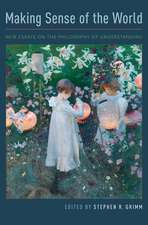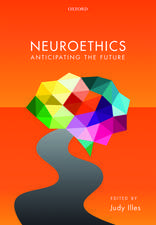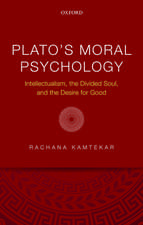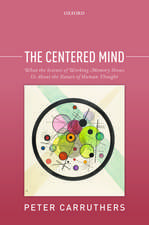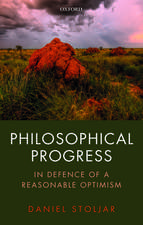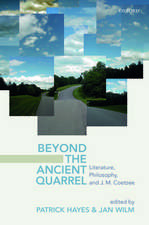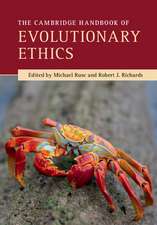A Philosophy for the Science of Well-Being
Autor Anna Alexandrovaen Limba Engleză Paperback – 28 sep 2021
| Toate formatele și edițiile | Preț | Express |
|---|---|---|
| Paperback (1) | 167.71 lei 11-16 zile | |
| Oxford University Press – 28 sep 2021 | 167.71 lei 11-16 zile | |
| Hardback (1) | 495.61 lei 32-37 zile | |
| Oxford University Press – 5 oct 2017 | 495.61 lei 32-37 zile |
Preț: 167.71 lei
Preț vechi: 188.64 lei
-11% Nou
Puncte Express: 252
Preț estimativ în valută:
32.09€ • 33.57$ • 26.66£
32.09€ • 33.57$ • 26.66£
Carte disponibilă
Livrare economică 03-08 martie
Preluare comenzi: 021 569.72.76
Specificații
ISBN-13: 9780197598894
ISBN-10: 0197598897
Pagini: 248
Dimensiuni: 155 x 231 x 18 mm
Greutate: 0.43 kg
Editura: Oxford University Press
Colecția OUP USA
Locul publicării:New York, United States
ISBN-10: 0197598897
Pagini: 248
Dimensiuni: 155 x 231 x 18 mm
Greutate: 0.43 kg
Editura: Oxford University Press
Colecția OUP USA
Locul publicării:New York, United States
Recenzii
A Philosophy for the Science of Well-Being is a foundational text in well-being studies and should be an early port of call for PhD students and others venturing into the field. It is timely, constructive and readily comprehensible. Economists should not avoid it simply because it is a philosophical text - its arguments are critical reading.
This is a brilliant book. The very idea of mid-level theories of well-being as the linchpin fastening the philosophy of well-being properly upon its science is original and important. The book is also impressive in its breadth, linking subjects as diverse as contextualism, theory construction, objectivity, and validation around the topic of well-being. Finally, its style is crystal-clear and to the point.
I can strongly recommend A Philosophy for the Science of Well-Being. The book will yield its greatest returns among two groups: Those within the field of philosophy (primarily interested in moral philosophy and/or the philosophy of science); and researchers in the social sciences (primarily those interested in social welfare and social policy; as well as measurement)... Alexandrova writes in a clear and coherent fashion. Topics and themes are carefully re-introduced (without redundancy) throughout the book, gently guiding the reader toward new concepts and new connections between topics.
After a careful and accessible review of the philosophical issues and those tied to science, respectively, Alexandrova offers readers a way through the challenges ... Psychologists pursuing research on well-being and related topics should read this wonderful work; failing to heed Alexandrova's insights will imperil their own arguments and findings. Highly recommended.
Anna Alexandrova's ambitious and timely book tackles these concerns head-on, raising important questions regarding the relationship between philosophy and science, and offering insights into how one might inform the other. ... The theory Alexandrova offers is thorough, detailed, and complex. ... Alexandrova's book is an important contribution to the study of well-being that warrants a careful study. It raises genuine challenges for both philosophers and scientists of well-being. If we take these challenges seriously, the study of well-being will no doubt progress.
This ambitious book is a significant contribution to the study of well-being and, more broadly, to our understanding of the relationship between philosophy and science. Its clear prose and clean structure make the book a pleasure to read. ... Alexandrova's book breaks new grounds. My hope is that contemporary philosophers and scientists will subscribe to Alexandrova's programme. If there are enough of us - both philosophers and scientists - who are willing to carry out the kind of research Alexandrova has proposed, it may generate new projects that involve deep, interdisciplinary collaborations that can truly enrich the field of well-being.
Essential reading for philosophers and social scientists who are puzzled by the concept of well-being and its tenuous relationship to empirical studies that purport to measure it. Alexandrova's contextual view of well-being and her account of how a science can address normative questions break new ground.
As the first book-length treatment of the philosophy of science underlying the science(s) of well-being, Anna Alexandrova's book isn't just a contribution to the field
In this superb book, Anna Alexandrova argues that the science of well-being derives its explanatory and normative power from theories that inhabit that unexplored sweet spot between philosophers' abstractions and psychologists' facts. By illuminating these "mid-level" theories, Alexandrova articulates fresh new answers to questions that have long bedeviled scholars: What is well-being? How can we measure it? And what steps can we take to promote it? This is philosophy at its best
A masterful synthesis of the philosophy and science of well-being. Alexandrova's book is compulsory reading for anyone interested in the philosophy or the science of well-being, particularly anyone with a view
It is difficult for philosophers like myself to accept that our theories of well-being should be both useful for and answerable to empirical research. I suspect many scientists are similarly tempted to set philosophy aside. If Anna Alexandrova's groundbreaking book doesn't convince us to work together, nothing will.
Anna Alexandrova has done an extraordinary job in fusing exciting new research in philosophy, psychology, social science, and economics to address the core issues in the foundations of well-being studies. The book contains a myriad of valuable insights and novel ideas that help us understand the concept of well-being, its measurement and application. No researcher interested human flourishing can afford to ignore it.
This is a brilliant book. The very idea of mid-level theories of well-being as the linchpin fastening the philosophy of well-being properly upon its science is original and important. The book is also impressive in its breadth, linking subjects as diverse as contextualism, theory construction, objectivity, and validation around the topic of well-being. Finally, its style is crystal-clear and to the point.
I can strongly recommend A Philosophy for the Science of Well-Being. The book will yield its greatest returns among two groups: Those within the field of philosophy (primarily interested in moral philosophy and/or the philosophy of science); and researchers in the social sciences (primarily those interested in social welfare and social policy; as well as measurement)... Alexandrova writes in a clear and coherent fashion. Topics and themes are carefully re-introduced (without redundancy) throughout the book, gently guiding the reader toward new concepts and new connections between topics.
After a careful and accessible review of the philosophical issues and those tied to science, respectively, Alexandrova offers readers a way through the challenges ... Psychologists pursuing research on well-being and related topics should read this wonderful work; failing to heed Alexandrova's insights will imperil their own arguments and findings. Highly recommended.
Anna Alexandrova's ambitious and timely book tackles these concerns head-on, raising important questions regarding the relationship between philosophy and science, and offering insights into how one might inform the other. ... The theory Alexandrova offers is thorough, detailed, and complex. ... Alexandrova's book is an important contribution to the study of well-being that warrants a careful study. It raises genuine challenges for both philosophers and scientists of well-being. If we take these challenges seriously, the study of well-being will no doubt progress.
This ambitious book is a significant contribution to the study of well-being and, more broadly, to our understanding of the relationship between philosophy and science. Its clear prose and clean structure make the book a pleasure to read. ... Alexandrova's book breaks new grounds. My hope is that contemporary philosophers and scientists will subscribe to Alexandrova's programme. If there are enough of us - both philosophers and scientists - who are willing to carry out the kind of research Alexandrova has proposed, it may generate new projects that involve deep, interdisciplinary collaborations that can truly enrich the field of well-being.
Essential reading for philosophers and social scientists who are puzzled by the concept of well-being and its tenuous relationship to empirical studies that purport to measure it. Alexandrova's contextual view of well-being and her account of how a science can address normative questions break new ground.
As the first book-length treatment of the philosophy of science underlying the science(s) of well-being, Anna Alexandrova's book isn't just a contribution to the field
In this superb book, Anna Alexandrova argues that the science of well-being derives its explanatory and normative power from theories that inhabit that unexplored sweet spot between philosophers' abstractions and psychologists' facts. By illuminating these "mid-level" theories, Alexandrova articulates fresh new answers to questions that have long bedeviled scholars: What is well-being? How can we measure it? And what steps can we take to promote it? This is philosophy at its best
A masterful synthesis of the philosophy and science of well-being. Alexandrova's book is compulsory reading for anyone interested in the philosophy or the science of well-being, particularly anyone with a view
It is difficult for philosophers like myself to accept that our theories of well-being should be both useful for and answerable to empirical research. I suspect many scientists are similarly tempted to set philosophy aside. If Anna Alexandrova's groundbreaking book doesn't convince us to work together, nothing will.
Anna Alexandrova has done an extraordinary job in fusing exciting new research in philosophy, psychology, social science, and economics to address the core issues in the foundations of well-being studies. The book contains a myriad of valuable insights and novel ideas that help us understand the concept of well-being, its measurement and application. No researcher interested human flourishing can afford to ignore it.
Notă biografică
Anna Alexandrova is a Senior Lecturer in Philosophy of Science at University of Cambridge and a Fellow of King's College, having previously taught at the University of Missouri St Louis. She writes on philosophy of social sciences, especially economic modelling, explanation, and the sciences of well-being. She was a recipient of the Philosophy of Science Association Recent PhD Essay Prize.

